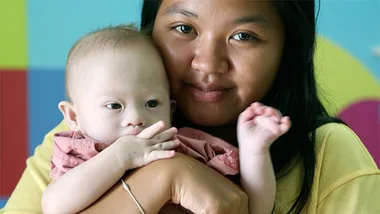Friday the 1st of August was supposed to be a good day. My son, Julius, who has Down syndrome, was due to appear in his fourth advertising campaign for the funky children’s fashion brand, eeni meeni miini moh.
I was feeling very proud of him. He’s come a long way, and he’s having a lot of fun.
But then Friday dawned, and with it the heartbreaking story of baby Gammy, a baby born to a surrogate in Thailand, and reportedly abandoned by his Australian parents, because he, like my son, has Down syndrome. Gammy’s story stirred up so many emotions in me that I found it hard to think about much else throughout the day.
The situation is now unclear as the alleged parents have claimed they didn’t know about Gammy while the surrogate mother says that they did.
But if the story of Gammy’s abandonment is true, including reports that it is only one of many such tragedies, it is shocking to think that in some ways we are the type of family that those parents didn’t want to be.
I have a husband, two daughters, and a son – who happens to have Down syndrome.
Not too different to the Australian family in the story – but, unlike our family, they didn’t take their son home from hospital. They left him in a foreign country – because they didn’t want to be like us?
That’s difficult for me to get my head around because I can’t imagine our little family any other way. And with almost one in five Australians living with a disability, our family is statistically not even unusual. We are in a real sense a “normal” family, whether or not others see us that way.
But the fact is, the way others see people with disabilities does matter.
The brutality of the prejudice, and the devaluation of the worth of that baby boy needs to be confronted, and addressed.
We need to change the attitudes and low expectations surrounding people with Down syndrome and other disabilities.
It’s those attitudes that make a decision by any parent to abandon their own baby seem like a real choice.
When our son Julius pops up in a mainstream advertising campaign, I believe that our family is contributing in some small way to improving attitudes to people with Down syndrome and other disabilities.
I am encouraged by the words of Graeme Innes, Chair of the Attitude Foundation Australia and former Disability Discrimination Commissioner: “We won’t change attitudes on these issues unless advertisers and the media represent the diverse nature of society, including positive images of people with disabilities.”
I was pleased to see on social media things are changing and that an increasingly large and vocal part of the community no longer tolerates the rejection of people with Down syndrome and other disabilities, who are entitled to be loved, to belong, to grow up within their family, attend regular school, access high quality health care, live in the community, get a job and live their lives to the fullest.
Gammy’s story is still unfolding, magnified by the heart-breaking separation of twins. It is a terrible story, but hopefully good will come of it, in the form of assistance for Gammy and his family; and in opening the eyes of many more people in our community to the importance of improving attitudes to people with disabilities, like my precious son Julius.
Catia Malaquias is a lawyer and mother-of-three.



